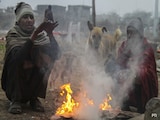O.J. Simpson, the American football star whose 1995 acquittal in the so-called "trial of the century" for the murder of his ex-wife and a male friend gripped the world, has died at the age of 76.
Once a beloved national figure, his fame turned to infamy after the savage killing of Nicole Brown Simpson and Ron Goldman in a suburb of Los Angeles.
The televised police chase to apprehend Simpson, and the extraordinary subsequent trial featuring high-octane lawyers and allegations of racism, were watched by millions on television.
His acquittal in October 1995 after nine months in court was greeted with disbelief by many Americans who had followed every twist and turn in the arguments over details as intricate as whether a pair of gloves really fitted the former athlete's hands.
"On April 10th, our father, Orenthal James Simpson, succumbed to his battle with cancer," a message signed by the family said Thursday on social media site X.
"He was surrounded by his children and grandchildren. During this time of transition, his family asks that you please respect their wishes for privacy and grace."
He had reportedly been battling prostate cancer.
Elite athlete
Simpson grew up in poverty and ill health but developed into an elite athlete, rising rapidly to stardom first as a college football player and then in the National Football League, where he won the 1973 Most Valuable Player award.
The Heisman Trophy Trust, which presents an annual award for top college football players, said it "mourns the passing of 1968 Heisman Trophy Winner O.J. Simpson."
His popularity only grew with a post-NFL career as an actor and an ad pitchman, where his appearances promoting everything from orange juice to car rentals made him one of the most recognizable Black faces in the country.
His work with Hertz in particular, where he was shown sprinting through airports while wearing a three-piece suit, became part of pop culture folklore.
That all came to an abrupt end on June 12, 1994 when Brown Simpson, 35, and waiter Goldman, 25, were found stabbed to death outside her home.
Public views on whether Simpson was guilty or innocent of murder divided sharply along racial lines.
And although allowed to walk free, there was no happy next chapter for "O.J." -- or "The Juice," as he was known.
Simpson was subsequently found liable for the deaths in a 1997 civil suit and was ordered to pay damages totaling $33.5 million to the families of the victims.
Fred Goldman, Ronald's father, spoke to NBC News Thursday and described Simpson's death as "no great loss."
"The only thing I have to say is it's just further reminder of Ron being gone all these years," he said.
Simpson also served nearly nine years in prison for a bungled armed robbery, before a parole board in the western state of Nevada approved his release in 2017.
Dismissed health concerns
But the public's fascination never waned.
"O.J.: Made in America," a nearly eight-hour documentary about his murder trial, won the best documentary Oscar in 2017.
And "The People v. O.J. Simpson: American Crime Story," a television mini-series starring Cuba Gooding Jr as the athlete, won multiple Emmy awards in 2016.
On February 9 this year, Simpson posted a video on X dismissing reports that he was in hospice care.
"You talking about hospice?!" he said laughing. "No, I'm not in any hospice. I don't know who put that out there."
Two days later, he posted his last X video.
"My health is good. I mean, obviously I'm dealing with some issues," he said.
"But I think I'm just about over it and I'll be back on that golf course hopefully in a couple of weeks.
(Except for the headline, this story has not been edited by NDTV staff and is published from a syndicated feed.)














